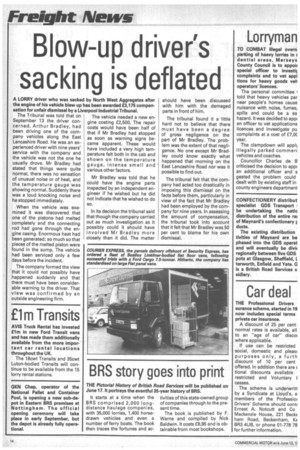Blow-up driver's sacking is deflated
Page 8

If you've noticed an error in this article please click here to report it so we can fix it.
A LORRY driver who was sacked by North West Aggregates after the engine of his vehicle blew up has been awarded £3,175 compensation for unfair dismissal by a Liverpool Industrial Tribunal.
The Tribunal was told that on September 13 the driver concerned, Arthur Bradley, had been driving one of the company vehicles along the East Lancashire Road. He was an experienced driver with nine years' service with the company and the vehicle was not the one he usually drove. Mr Bradley had stated that things were quite normal, there was no sensation of unusual noise or of heat, and the temperature gauge was showing normal. Suddenly there was a loud knocking noise and he stopped immediately.
When the vehicle was examined it was discovered that one of the pistons had melted completely and the connecting rod had gone through the engine casing. Enormous heat had been generated; so much so that pieces of the melted piston were found in the sump. The vehicle had been serviced only a few days before the incident.
The company formed the view that it could not possibly have happened suddenly and that there must have been considerable warning to the driver. That view was confirmed by an outside engineering firm. The vehicle needed a new engine costing £2,500. The repair costs would have been half of that if Mr Bradley had stopped as soon as warning signs became apparent. These would have included a very high temperature felt both in the cab and shown on the temperature gauge, intense smell and' various other factors.
Mr Bradley was told that he could have the engine parts inspected by an independent engineer if he wished but he did not indicate that he wished to do so.
In its decision the tribunal said that though the company carried out as much investigation as it possibly could it should have involved Mr Bradley more closely than it did. The matter should have been discussed with him with the damaged parts in front of him.
The tribunal found it a 'little hard not to believe that there must have been a degree of gross negligence on the part of Mr Bradley. The problem was the extent of that negligence. No one except Mr Bradley could know exactly what happened that morning on the East Lancashire Road nor was it possible to find out.
The tribunal felt that the company had acted too drastically in imposing this dismissal on the facts before them, particularly in view of the fact that Mr Bradley had been employed by the company for nine years. In assessing the amount of compensation, the tribunal took into account that it felt that Mr Bradley was 50 per cent to blame for his own dismissal.






















































